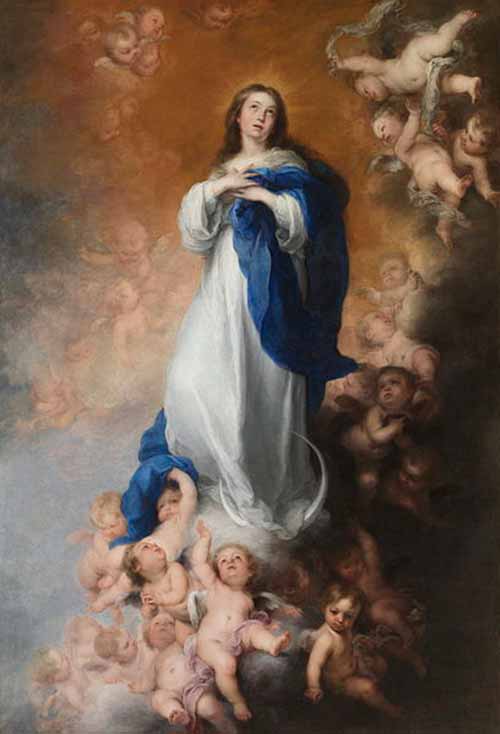
Today is the Feast of the Immaculate Conception of Mary. The Immaculate Conception is not about sex. The Immaculate Conception is not a celebration of the way that Jesus was conceived – it is often confused with the story of the Virginal Conception of Jesus by Mary and Joseph. This regularly happens in conversations, in the media, and even by well-educated Roman Catholics who are the ones who are required to hold to the doctrine of the Immaculate Conception.
In fact, in 1677, the Pope condemned people who taught that Mary was conceived with her mother remaining a virgin!
The Immaculate Conception is the claim that Mary never had Original Sin – from the moment of her conception by Anne. So it hinges on an understanding of Original Sin – a Western understanding not shared by Eastern Orthodoxy, for example. Orthodoxy does not hold to Augustine’s idea that we all share the guilt of Adam’s sin. In Orthodoxy, we are all conceived with the image of God – in some sense, then, Orthodoxy does not affirm the particular immaculate conception of Mary because, in a manner, we are all so conceived. Orthodoxy, then, tends to see sin as an illness (a therapeutic model with the church as a hospital for sinners). The West tends to see sin as moral failure (with a juridical model of sin – and often an angry God needing satisfaction and assuaging).
Contemporary Protestants often fear (when they correctly understand the Western teaching) that the Immaculate Conception bypasses Christ’s redemption. It specifically does not – Mary’s sinlessness is due to Christ’s salvation.
Contemporary Protestants are often revisionists, without a historical appreciation of their own founders. In 1544, Martin Luther said, ‘God has formed the soul and body of the Virgin Mary full of the Holy Spirit, so that she is without all sins, for she has conceived and borne the Lord Jesus.’ And: “All seed except Mary was vitiated [by original sin].”
In fact, most contemporary Protestants would mistake the teachings of the Reformers about Mary as being that of Roman Catholics. Calvin, Luther, Zwingli, and Wesley all accepted the perpetual virginity of Mary. The Book of Common Prayer and (binding) contemporary Anglican revisions call Mary “The Blessed Virgin Mary” – referring to her as a virgin throughout her life. [Not to mention defining Anne, of whom there is no mention in the Bible, to be the mother of the Blessed Virgin Mary].
Anglicans celebrate two conceptions: that of Christ (March 25) and that of Mary (December 8 ). Here is the Church of England collect for the feast of The Conception of the Blessed Virgin Mary:
Almighty and everlasting God,
who stooped to raise fallen humanity
through the child-bearing of blessed Mary:
grant that we, who have seen your glory
revealed in our human nature
and your love made perfect in our weakness,
may daily be renewed in your image
and conformed to the pattern of your Son
Jesus Christ our Lord,
who is alive and reigns with you,
in the unity of the Holy Spirit,
one God, now and for ever.
If you appreciated this post, consider liking the liturgy facebook page, using the RSS feed, and/or signing up for a not-very-often email, …




Dear Bosco, as I have just stated on ADU, I have no problem with the term ‘Immaculate Conception’.
As an Anglo-Catholic, though, I would not attribute this to (of) the Blessed Virgin Mary – except that, in her womb, what might be termed an ‘Immaculate Conception’ did, in fact, take place, by the power of the Holy Spirit.
If ever there was an Immaculate Conception, it was of Jesus, not his Mother (and I have a special devotion to the Blessed Virgin Mary).
Jesus was the divine Instrument of overcoming the power of ‘Original Sin’ – not his Mother. Her virtue was obedience – not her virginity. (IMHO – on this day when I will be celebrating her Feast).
Fr Ron,
“Jesus was the divine Instrument of overcoming the power of ‘Original Sin’ – not his Mother. ”
In principle, yes, but in practice, no.
God seems to delight in cooperation with human beings to carry out his mission, as God did preeminently with blessed Virgin Mary, and as God continues to do with us.
Happy feast day!
Very beautiful reflection from Pope Francis.
https://zenit.org/articles/pope-francis-meaning-of-full-of-grace/
Many blessings
Thanks, Chris.
While the Pope gets it correct (no surprise there!), I AM surprised that the original Zenit article (or its translator from Italian) gets it quite wrong: it is not at all the case that “At the Immaculate Conception, the angel addressed Mary…”
In the Christchurch Press, this morning, there was an article about the Pope’s reflection on the Lord’s Prayer – complete with analysis of the Greek! I don’t think it is that slow a news day (there’s always Trump!) so (wonderfully!) Pope Francis continues to fascinate, even in our secular nation. [Spoiler – I might yet blog on the Pope’s point next week].
Blessings.
Very interesting quote from Luther. I wouldn’t have expected it.
Chris – au contraire – you will notice I mentioned that JESUS was the DIVINE instrument. Mary was a human instrument – through whom God worked – as with us!
Fr Ron,
Yes, I took your “divine instrument” in the sense of “an instrument of the divine”. Although if one believes in divinisation…
Chris, granted that we are moving towards our human integration with the divine, but we aint there yet!
Er… The Eastern-Orthodox do believe the reality of the original sin. The nature of the sin has many faces; failure, missing the goal, “guilt”…
We are “guilty” of the protoparents’ sin, the same way Aaron has “payed” tribute to Melchizedek, being in his “loins”.
Post-modern revisionists (generally converts) often don’t want to see that. The fact that there be a nuance between the West and the East about the original sin changes strictly nothing to the problem of the immaculate conception.
I believe the original sin dilemma (as well as other topics, such as Judas’ fate, predestination) can be solved by our knowledge about the relativity of the time-space. Chronology must sometimes be reversed.
The problem is, in fact, our conception of time, whereby we circumscribe God within time, as if he be coeternal with time. Therefore, we see the conception of Mary as prior to the Annunciation, which be also prior to the sacrifice on the cross. We need to see those events the other way round.
Thanks, George.
There are often two problems in conversations – people using different words to mean the same thing; people using the same words, but meaning different things. When you say “Eastern-Orthodox do believe the reality of the original sin”, Western Christians may hear something quite different to what you intend.
Many (most?) will hear this through the filter of St Augustine.
It may also be the case that there are a variety of understandings of the original sin amongst Orthodox.
As if to confirm my point of the (Western) misunderstanding of “The Immaculate Conception”, two days after the feast, there was an article in our news which confused it with a virginal conception. Even in the comments above, there is a reworking of its understanding.
Blessings.